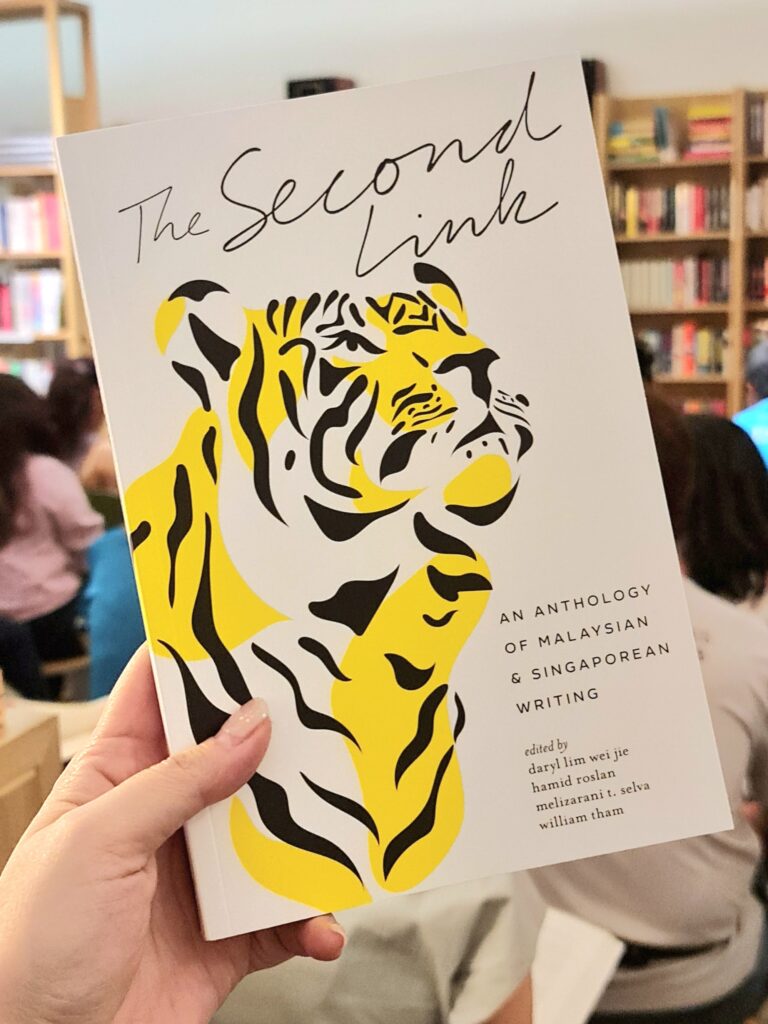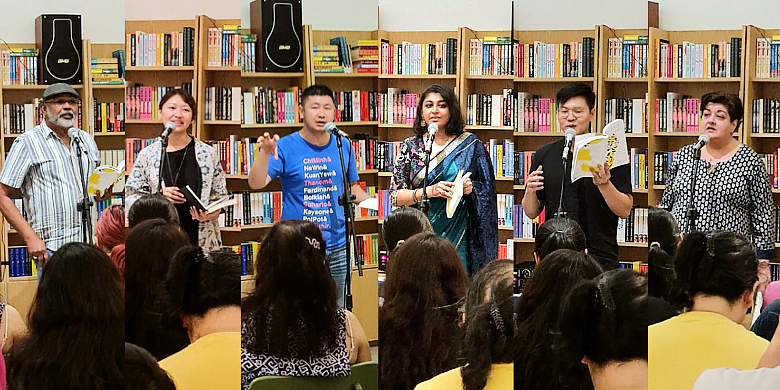
2023 marks 60 years since the territories of Malaya, Singapore, Sabah and Sarawak were brought together to form Malaysia. Much has transpired in the decades since, not the least of which was the ousting of Singapore from this alliance just a couple years later. Nevertheless, our two nations still share a bond, though it may be at times a fractious one.
Two years ago, Daryl Lim Wei Jie, a poet, translator and literary critic from Singapore, had this idea to commemorate our two nations’ shared history with an anthology that would bring together writers from both countries to engage creatively and critically with this sense of entwinement. He roped in fellow Singaporean writer Hamid Roslan onto the project, as well as two Malaysian writers and editors, Melizarani T. Selva and William Tham. The result is The Second Link, put forth by Singapore publisher Marshall Cavendish in September, and which we had the pleasure to launch at Lit Books on Malaysia Day, 16th Sept, 2023.
With the Malaysia-Singapore relationship as its central theme, the book is an anthology of fiction, essays, short monographs on specific topics, poetry, and photography. Expertly curated, each piece is reflective of our thoughts during quieter moments: Who are we? What are we doing? Where are we going? How did things get to be the way they are today? In other words, questions that circulate in our subconscious, hidden beneath the froth of our day-to-day. The Second Link does a superb job in bringing these ponderings to the forefront, and is an excellent anthology that deserves a place in the regional literary canon.
At the launch, three of the four editors — Daryl, Melizar, and William — sat down with Lit Books founder Fong Min Hun and a packed audience to talk about the book. Six of the contributors were also at hand to read snippets from their pieces. The following are edited excerpts from the conversation with the editors.
Min Hun: I’d like to know more about the provenance of this anthology. Daryl, you were the mastermind. How did this idea come into your head?
Daryl: I’m a student of history and that’s really where I come from. I did my undergrad and master’s in history, and I’ve always been very interested in Singapore’s and Malaysia’s history. To me as a historian, dates and significant anniversaries are very important. Two years ago, I started to think about how in 2023 it’ll be the 60th anniversary of the formation of Malaysia and also of the merger between Singapore and Malaysia.
As the idea grew prominence and force in my mind, I felt that it’s very odd that at least from Singapore’s side, no one really thinks of it as the 60th anniversary of the formation of Malaysia. In fact, if you go on Singapore news right now, what is really being given prominence is the 100th birthday of Lee Kuan Yew. But then again, that makes you think what a fortuitous coincidence that Kuan Yew’s birthday was the day Malaysia was formed. To me, the conjunction of those two events was a call to action in my mind that something had to be done. What I wanted to do is to bring together writers from Singapore and Malaysia, and part of that reason was because I had already been quite involved in the Malaysian scene.
I was a good friend of the late [Malaysian poet] Wong Phui Nam, and he and I actually had a really interesting and unusual relationship considering that we were almost 50 years apart in terms of age. But we somehow became very good friends after I met him. I loved his poetry, and he, sadly died last year. So that connection, the significance of the dates, the fact that I felt Singaporeans were going to forget — and they did forget, as the news tells you — made me want to do this. The other reason is I think in the past, the ties between Singapore and Malaysia in the 60s, 70s and 80s were much stronger between the two groups of writers. Famously there was this anthology from the 70s called The Second Tongue, which Edwin Thumboo edited, and it was a poetry from Malaysia and Singapore.

Min Hun: How did you assemble this motley crew of editors?
Daryl: It wasn’t very structured at first. Actually, the one who’s not here, Hamid Roslan, might be the first person I approached. I felt he would be perfect because he has very interesting thoughts on being Malay in Singapore. I thought he brought an interesting perspective. Then I got to know Melizar quite well… I think she, being a Malaysian Indian working in Singapore, again brings an interesting perspective — you’re away from home, but you’re very close to home; things are very similar, but also totally different. William was brought in by Melizar because William has a more academic background, and so some of the more academic essays in the book were shaped by him. He brought a lot of that deep knowledge and thinking, which I think gives quite a significant depth to this book.
Min Hun: William, in addition to being a writer, has also edited his own anthology of essays before. How did you find the experience this time around with The Second Link?
William: With every single book that comes out, it’s always quite an adventure because while you have a general idea of the mechanics of the process when it comes to soliciting entries, for example, and working with individual contributors, every book does have its own particular special trajectories. They go from one place to another without you ever knowing how things will turn up in the end. For this anthology, there’s a lot of stuff for you to parse through. There’s a lot more agency on the part of the reader this time. Rather than the editorial sense of telling you what to expect, it’s very much an invitation to walk through the entries one after another to decide, in terms of interpreting the text themselves, what constitutes fact, what constitute fiction, and the idea of generic boundaries as well, and how these are all very much permeable and fluid. This was a very different experience in that regard.
Min Hun: Melizar, can you tell us your experience of working on The Second Link?
Melizar: I had the opportunity and privilege of editing mostly Singaporean writers, which is very strange how that all came together. During the editorial process, we received about 70 submissions via the open call, and we also invited a few other writers to contribute because we wanted to balance out the themes — we didn’t want all these tired tropes in the book. Once we received the pool of stories, Daryl, William, Hamid and I got on Zoom, and we asked each other which stories we each wanted to work on. We chose stories that we had an affinity for, and that we wanted to work with the writer on. Ultimately we asked ourselves, do we want to be advocates for this narrative? So that’s how we chose the stories that we had.
Daryl: What’s different about this book is that the submissions we received were not completed pieces. What we asked the writers to submit were pitches — the majority of them had not written the story or piece that you have now in the book. They just gave an idea and also some examples of their past writing. What this means is effectively we had 30 projects ongoing at one time. We were each working with the writers to shape their various pieces, and along the way we would check in. In some ways that explains why the book is special because there was a kind of mental coming together in that everyone converged on the same themes and the things we were looking for. That makes the book a bit more special and why I think we were able to make something cohesive, although people were doing lots of different things.

Min Hun: I’d like to come back to the title of the book, The Second Link. You’ve already mentioned that it’s a homage to The Second Tongue. Is there a more abstract hidden meaning to it as well?
Daryl: Yeah, I guess in some ways The Second Tongue was Edwin Thumboo gathering all these Singaporean and Malaysian poets to prove to the British, the Americans, all these so-called native speakers, that we could write poetry in English. With this sequel, we don’t need to prove it anymore; they are no longer in the picture. It’s not about the tongue that is in question; the focus is on ourselves and the relationship between the two countries, which I think, at least from the Singaporean perspective, we often take for granted.
Min Hun: William, with some of the academic essays — especially the one by Jonathan Chan, which I enjoyed tremendously, profiling two enfants terribles and their opposing viewpoints in terms of searching for identity — is this question of a missing sense of self something you find intellectually interesting?
William: In many ways it actually ties in to a lot of the work that I’ve been doing as part of my postgraduate studies, different ideas of self as well as that relationship of self to a particular national identity. And I think this might be a point that ties together a few ideas that we’ve been talking about today, like the idea of Malaysian-ness or Singaporean-ness, but also as alluded to in quite a few of the pieces that are scattered throughout the book, this idea of what other kinds of imaginaries could look like. It’s sort of like the Malayan vision that was very much in the ad in the immediate post-war period. This of course all gets intertwined with questions of decolonisation, empire, but also in a lot of different ways, that idea of what was then the Malay states as well as Singapore as a broader shared national imaginary. This anthology is very much a way for us to reflect upon the different ways in which we imagine what the country could look like.
Even as we talk about today’s 60th anniversary of the formation of Malaysia, one aspect that I think gets overlooked a lot is how in some of the promotional material that was created to celebrate the formation 60 years ago, there was one song called Lima Negara or Five Countries. The fifth mission country in this case was Brunei. What we knew as Malaysia didn’t last quite as long as those working in highest levels would’ve liked to think. So again, this is an invitation for us to think about the different ways in which we constitute ourselves in relation to the imagination states that have emerged.
Get a copy of The Second Link from our physical store or online.
